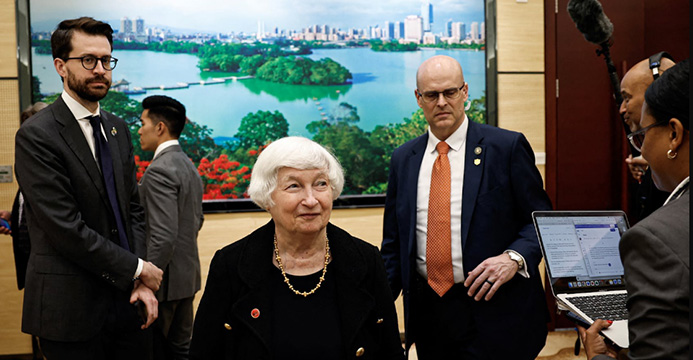
U.S. Treasury Secretary Janet Yellen (photo) warned China on Monday that Washington will not accept new industries being decimated by Chinese imports, as she wrapped up four days of meetings to press her case for Beijing to rein in excess industrial capacity.
Yellen told a press conference that U.S. President Joe Biden would not allow a repeat of the "China shock" of the early 2000s, when a flood of Chinese imports destroyed about 2 million American manufacturing jobs.
She did not, however, threaten new tariffs or other trade actions should Beijing continue its massive state support for electric vehicles (EVs), batteries, solar panels and other green energy goods.
China and the United States reached consensus in economic and financial areas during the visit by US Treasury Secretary Janet Yellen, and Beijing is willing to work with Washington to turn the consensus into practical outcomes, thereby improving bilateral economic ties, a senior Chinese official said on Monday, Chinese ‘People's Daily’ informs.
Liao Min, vice-minister of finance, made the remarks while giving a briefing on the outcomes of Yellen's visit.
"Deepening economic and financial policy coordination and mutually beneficial cooperation between the world's two largest economies is of great significance for maintaining the stability of the economic and financial systems of both countries and the world, as well as for promoting post-pandemic economic recovery and development, for which China has always maintained an open and positive attitude," Liao said.
Liao said the two sides have agreed to conduct in-depth discussions on the issue of balanced growth of the two countries and major economies through bilateral channels, which aligns with China's policy objectives and practices for economic transformation and high-quality development.
They also agreed to maintain communication on issues such as addressing the debt issues of developing countries and reforms of international financial institutions under multilateral channels such as the G20, in order to jointly deal with global challenges. This comes as the global economy is experiencing high levels of debt, inflation and interest rates and low growth, with emerging markets and developing countries significantly affected by the spillover effects.
Both sides agreed to continue conducting exchanges and cooperating on issues such as financial stability, sustainable finance, anti-money laundering efforts, and counterterrorism financing.
Zhang Monan, deputy director of the Institute of American and European Studies at the China Center for International Economic Exchanges, said: "Both sides need to listen to each other and work together to find solutions to their differences. They need to reach consensus on major issues of principle and, more than anything else, to translate the consensus into concrete action."
Yellen used her second trip to China in nine months to complain that Beijing's overinvestment has built factory capacity far exceeding domestic demand, while fast-growing exports of these products threaten companies in the U.S. and other countries….
China's vice finance minister, Liao Min, told Chinese media that Beijing "has fully responded" to U.S. questions on overcapacity and expressed "grave concern" over restrictions Washington imposes on trade and investment.
Janet Yellen confronted her Chinese counterpart about China’s surging exports of inexpensive electric vehicles and other green energy goods, saying that they were a threat to American jobs and urging Beijing to scale back its industrial strategy, the U.S. government has said…
The U.S. and China agreed to hold additional talks in the future about curbing international money laundering and fostering “balanced growth.” The latter is aimed partly at addressing concerns that China’s focus on factory production to bolster its sputtering economy has resulted in a glut of exports that is distorting global markets.
After the conclusion of the talks the Chinese state-run news agency Xinhua reported that Chinese officials had expressed their own frustrations to Ms. Yellen about American economic strategy.
“China has expressed serious concern over the U.S. economic and trade restrictive measures against China, and responded fully on the issue of production capacity,” Xinhua said.
Beyond economic issues, Ms. Yellen and Mr. He discussed Russia’s war in Ukraine and growing concern in the United States that Chinese companies were helping to support Moscow’s military. The Biden administration has already been imposing trade restrictions on Chinese companies that it has accused of violating U.S. sanctions.
Nothing new – restrictions and threats…
read more in our Telegram-channel https://t.me/The_International_Affairs

 11:47 10.04.2024 •
11:47 10.04.2024 •






















